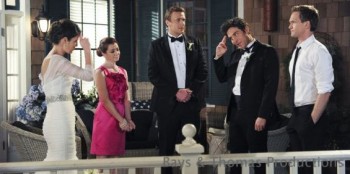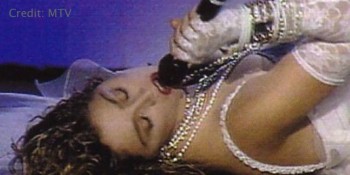How I Met Your Mother has ended after nine long years. It was a crazy journey, and one that ended quite controversially.
The show has gone down a windy road full of situations that were relatable and situations that seemed completely implausible. For every tragic moment about the loss of a loved one, there were several moments involving robots fighting wrestlers. But sometimes, even the craziest moments of our favorite shows can come to life.
In the most amazing instance of life imitating art, I found myself in the role of the gang in the season 2 episode, “Monday Night Football.”
In the episode, the gang realizes at the last minute that they will be unable to watch the Super Bowl live. Still, they all want to experience the game as everyone else did: with all of the thrill and uncertainty of a live viewing. To accomplish this, the entire gang had to find ways to avoid every spoiler that could come their way. No news, no talking to anyone, and no televisions that might give away the results.
Replace the Super Bowl with the series finale of How I Met Your Mother, and you will understand my Monday night experience.
I was called in to work at 8:30 p.m. on the night of the finale. With How I Met Your Mother running from 8 to 9, there was no way I could catch the show. Even worse, I work at a CBS affiliate.
Prior obligations held me up until 8 p.m., and immediately upon arriving at CBS, I had to keep myself occupied and away from television for half an hour. That’s pretty much impossible inside a television station. Then, when the finale was over, I had to preface every conversation with, “No spoilers!”
Co-workers had tears in their eyes and wanted so much to talk about the finale. All social media was off-limits until after I could finally watch the show. And to top off the wonderful humor of my night, the news did a segment on the How I Met Your Mother finale.
In a scene practically identical to Robin’s in “Monday Night Football,” hearing that How I Met Your Mother was in our rundown caused me immediate panic. I begged the producers not to run the story, but with no such luck. I fell just short of putting hands over my ears and shouting nonsense to drown out the sound of spoilers.
Luckily, the conversation on-air remained vague, and I was able to make it home, spoiler-free, to watch the finale of a show that took me on a journey: a show that made me feel wonderful and terrible — that was relatable to me, while still reminding me of the sitcoms of my childhood.
The final episode of How I Met Your Mother was difficult for many of us to watch. All shows naturally have a difficult time wrapping up all of their stories in a way that is acceptable to the fan base. The creators of How I Met Your Mother made the task even more difficult by using the finale as an epilogue of sorts, to show where every member of the gang would end up. Unfortunately for this fan, their journeys were unsatisfying. Spoilers ahead.
An entire season was built around the wedding of Barney and Robin. After years of development and tremendous growth, these characters finally felt like they were gaining a measure of happiness and closure. Barney and Robin were each other’s perfect foils: a man and woman who loved each other, warts and all, and brought out the best in each other. The last two seasons of the show were dedicated to showing fans why Barney and Robin deserved to be together. But that doesn’t matter anymore, because they will only be together for three unhappy years.
Ted’s journey has always been the center narrative of the show. The final season was dedicated to the tragedy of Ted and Robin. Ted had spent years imagining a world in which, against all odds, he and Robin would somehow end up together. The idea that he was wrong, and his need to find love was so strong that it was distorting his judgment, made the show better than any other traditional sitcom of the day. Ted’s difficulty in moving on from an unhealthy and unhappy relationship was something every one of us could relate to. But he had to move on because there was still something better out there for him. There was someone waiting for him who would love his calligraphy hobby, his long-winded stories, and the way he pronounced “renaissance” faire. It was a lesson in patience and self-respect. By not settling for a poor match, Ted was able to finally find a woman who wasn’t perfect, but was perfect for him. Ted was able to accept the love he deserved.
But that doesn’t matter anymore because they will only be together for 10 years. Robin is the happy ending. By shifting to the ending that saw Ted and Robin back together, the show abruptly changed from one about false hope and overcoming preconceived ideas about our future to one that said, “Yeah, you totally will end up back together.” Was Tracy, The Mother, just a consolation prize? And is Ted going to spend the rest of his life with a woman who doesn’t even appreciate his interests?
Despite my misgivings, I am thankful for what Carter Bays and Craig Thomas gave to us. Even when the show was not at its peak, it was still enjoyable. The creators of How I Met Your Mother created a television classic that was unafraid to take risks, a show that knew how to play with the classic sitcom formula in a way that felt both familiar and unique. I may not be happy with the ending of the show or its final message, but that is only because I am able to relate to it so well. We’ve all had a Robin in our lives that we just can’t shake. And we all hope one day to find our Tracy. We need to appreciate every single second we get with those we love and remember why they were so special even after they’re gone.
How I Met Your Mother reminded us that love stories are often messy, and happy endings are only a matter of when the story cuts off. If nothing else, the show will always be relatable, even in the most obscure and seemingly impossible situations.
After all, I never thought I would ever need the Sensory Deprivator 5000, but it certainly would have made last night a lot easier.



